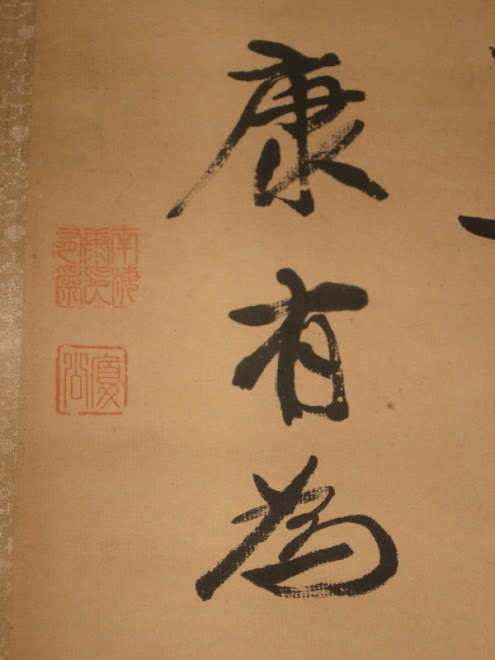 |
| Kang Tongbi founded this organization in 1903 in Canada, the US, and Hawaii. South Windsor Kang Tongbi collection. |
In 1903, Kang Tongbi came to North America for six years of education and Baohuanghui organizing. She began her North American sojourn In Victoria and Vancouver/New Westminster, BC, where she founded two branches of a feminist-oriented Chinese Empire Ladies Reform Association. Like the regular Baohuanghui chapters, photo posters were produced showing the officers and their titles. Branches were formed in the Pacific Northwest, Honolulu, New York, and other cities in the Northeastern US. The members were mostly wives of Baohuanghui leaders.
The poster celebrates heroic Western women like Joan of Arc who died for a cause and equally audacious and militant Chinese heroines like Qin Liangyu (1574-1648), a female general of Ming dynasty. Perhaps most surprising is the almost contemporary Russian lady assassin of Tsar Alexander II, Sophia Perovskaia (1854-1881), whose deeds had just been fictionalized in Chinese form as a serialized novel in Liang Qichao's journal, Xin Xiaoshuo (November 1902--June 1903).
Below is a translation by Hongmei Sun of George Mason University and Hu Ying of UC Irvine. There are various ways the poem can be punctuated and translated, and Jane Leung Larson is responsible for the final wording below. A large format downloadable copy has been provided by Harvard-Yenching Library, which has the same poster.
Victoria Chinese Empire Ladies Reform Association Poster
[translation by Hongmei Sun, University of Massachusetts
Amherst, 2010—now professor at George Mason University; revised by Hu Ying, UC
Irvine, author of Tales of Translation, 2000; final wording by Jane Leung Larson.]
Top: True Images of
the Personnel of the Save the Great Qing Emperor Guangxu Women’s Association
Paired couplet on sides:
Right: When we read
the histories of distinguished Asian women, we find Feng Liao who served as a
diplomatic envoy [in Western Han] and [Qin] Liangyu who came to the emperor’s
aid when he was imperiled.[1]
Great women heroes continue to rise up and mount the chariots
of war led by the “Four Black Steeds.”[2]
Left: We study books
about regime changes in other countries-- Joan of Arc who sacrificed her life
for her country and Sophia Perovskaia
who wiped out the tyrant. Great
achievements by women are adding brilliance to [the Chinese] continent and
civilization.
Left of top group of pictures: Living in Victoria,
Canada
Right of top group of pictures: Established in midsummer, 29th
year of GX [1903], 40th year of the Sexagenary cycle
Center Circle:
Guangxu [drawing]
Left: Liang Qichao; right: Kang Youwei—no identification
Below Guangxu, Women’s Association president Kang Tongbi
Slogan bottom: In the rise of the country or its fall, men
and women share equal responsibility.[3]
[women’s titles and names not translated but many titles echo
those found in posters of general Baohuanghui chapters, whose members are all
men]
--------------------
读亚洲女杰史、冯嫽持节、良玉勤王、巾帼雄才、继驷铁、小戎以起[4]
考各国政变书、贞德殉邦、菲亚除暴、裙钗伟烈、耀冠裳、大陆而来
冯嫽 Feng Liao is a female diplomat of Western Han; 秦良玉 Qin Liangyu (1574-1648) is a female general of Ming dynasty; 贞德,Joan of Arc; 菲亚 [蘇菲亚] Su Feiya--Sophia Perovskaia (1854-1881),”infamous anarchist assassin of Tsar Alexander II” [Tales of Translation, Hu Ying,2000, 9]—p 117, Liang Qichao, Xin Xiaoshuo Nov 1902 to June 1903 serialized novel, Dong’ou nuhaojie [Female Heroes of Eastern Europe] on Sophia and other women. Novel originally published with running commentary by Han Wenju [Kang Youwei student who copied his nianpu in Japan]
冯嫽 Feng Liao is a female diplomat of Western Han; 秦良玉 Qin Liangyu (1574-1648) is a female general of Ming dynasty; 贞德,Joan of Arc; 菲亚 [蘇菲亚] Su Feiya--Sophia Perovskaia (1854-1881),”infamous anarchist assassin of Tsar Alexander II” [Tales of Translation, Hu Ying,2000, 9]—p 117, Liang Qichao, Xin Xiaoshuo Nov 1902 to June 1903 serialized novel, Dong’ou nuhaojie [Female Heroes of Eastern Europe] on Sophia and other women. Novel originally published with running commentary by Han Wenju [Kang Youwei student who copied his nianpu in Japan]
小戎is a poem from 《诗经-秦风》;chariot;
驷铁is also
a poem from 《诗经-秦风》;four
black steeds
冠裳:
official garb; civilization; specifically, Chinese civilization.
[1]
Qin Liangyu was the first female to lead a military force, in late Ming, took
over husband’s troops when he died, celebrated by emperor for her fights
against the Manchus and Sichuan
rebels. The term “Qin Wang” or “come to the aid of the emperor when he is
imperiled” was used by Kang to describe the 1900 Datong Uprising, which failed
badly.
[2]
This refers to the military glories commemorated in the “Four Black Steeds” and
“Soldiers’ Chariots” of the Book of Songs.
[3]
国家兴亡,男女同责,the rise or fall of
the country, men and women are equally responsible for it—based on the popular
slogan “国家兴亡,匹夫有责”,The rise or fall of the country, everyone is
responsible for it; or, Everyone has a share of responsibility for his country.
[4]
Hu Ying punctuates the last two phrases of both lines as继驷铁小戎以起 . . . 耀冠裳大陆而来.
The term 大陆 or continent/great land
may also signify North America and the phrase translated
as "But, there are talented Chinese women who have come to the great land
[the American continent?] and brought honor [to their country] wearing men’s
clothes [boldly going out in the world as equals to men]."

No comments:
Post a Comment